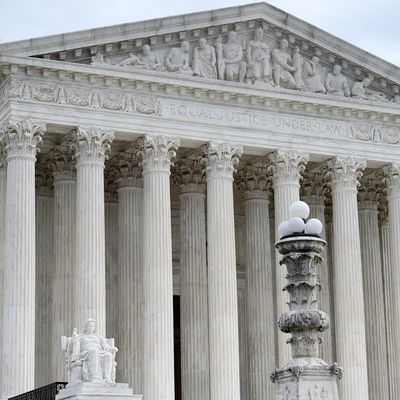
Late Monday, the Wisconsin Supreme Court insisted on maintaining an in-person coronavirus-plagued primary (and for certain offices, general election) contest for Tuesday, April 7, despite a massive shortage of poll workers and a lot of voters rightly terrified of congregating. In so doing the Wisconsin court’s 4-2 conservative majority confirmed the wishes of the Republican-controlled legislature in this intensely polarized state, where the GOP would prefer to keep turnout limited. A few hours later the 5-4 conservative majority on the U.S. Supreme Court delivered another win for Wisconsin Republicans by overturning a federal district judge’s effort to let voters wait for delayed absentee ballots put them in the mail after the statutory election-day deadline, up until April 13 (the deadline for receipt of such ballots). As a result, Wisconsin’s much-disputed election will begin and end on April 7 after all — the only in-person statewide voting event in the entire month of April.
The majority opinion was delivered per curiam, which means no individual Justice accepted responsibility for sponsorship — the usual procedure with brief and relatively inconsequential decisions, unlike this one. The opinion stressed the very late intervention by federal judge William Conley; the original petitioners’ failure to specifically request a delay in the date for postmarking absentee ballots; and the unusual nature of Conley’s subsequent decision ordering county election officials not to report results until the April 13 deadline for receiving absentee ballots. And the majority tried to avoid any complicity in the legislature’s decision to insist on an election in the middle of a pandemic:
The Court’s decision on the narrow question before the Court should not be viewed as expressing an opinion on the broader question of whether to hold the election, or whether other reforms or modifications in election procedures in light of COVID–19 are appropriate. That point cannot be stressed enough.
A dissent was written by Justice Ruth Bader Ginsburg, with the concurrence of Justices Breyer, Sotomayor and Kagan — and brushed aside the majority’s effort to ignore the incredibly strange circumstances of the case:
Because gathering at the polling place now poses dire health risks, an unprecedented number of Wisconsin voters—at the encouragement of public officials—have turned to voting absentee. Id., at ___, 2020 WL 1638374, *4. About one million more voters have requested absentee ballots in this election than in 2016. Ibid. Accommodating the surge of absentee ballot requests has heavily burdened election officials, resulting in a severe backlog of ballots requested but not promptly mailed to voters.
The facts on the ground changed even as Conley considered petitions to liberalize absentee ballots, and by the time he ruled there were potentially tens of thousands of voters who either hadn’t received the ballots they were entitled to cast, or didn’t have time to return them. The Court majority would force them to sacrifice their right to vote by no fault of their own. Thus, concludes Ginsberg, the majority’s scruples about Conley’s late intervention would have been better devoted to its own last-minute decision:
The majority of this Court declares that this case presents a “narrow, technical question.” Ante, at 1. That is wrong. The question here is whether tens of thousands of Wisconsin citizens can vote safely in the midst of a pandemic. Under the District Court’s order, they would be able to do so. Even if they receive their absentee ballot in the days immediately following election day, they could return it. With the majority’s stay in place, that will not be possible. Either they will have to brave the polls, endangering their own and others’ safety. Or they will lose their right to vote, through no fault of their own.
That’s certainly the effect of the combined work of conservative judges in Madison and in Washington. The GOP legislature’s mad determination to move ahead with an in-person election, while cutting off the safer avenue of voting by mail, is designed to restrict the franchise, and in that sense, will be deemed a success tainted by partisan malice.






























